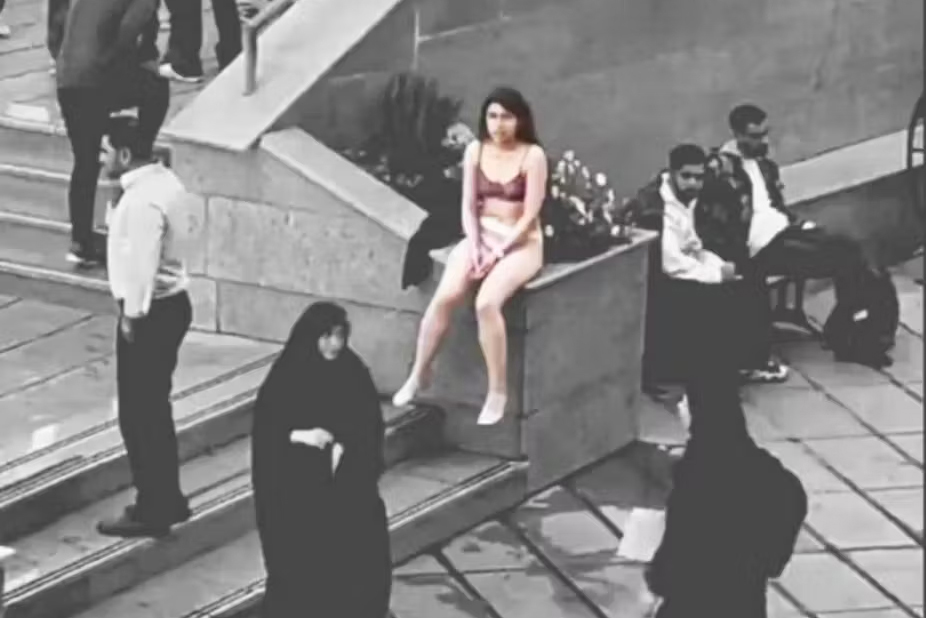
By Hind Elhinnawy
More than two years have passed since a young woman called Mahsa Amini died in police custody after being arrested in Iran for allegedly not wearing her hijab properly. Her death sparked mass protests throughout Iran against the country’s ruling theocracy.
The fight of Iranian women for freedom and bodily autonomy now rages on. Ahou Daryaei, a 30-year-old French language student at Tehran’s Islamic Azad University, has become the latest symbol of this resistance.
On November 2, Daryaei removed her clothing and walked onto the street in her underwear after an assault by members of the Basij paramilitary force, which is tasked with enforcing the country’s draconian dress code.
This powerful act, which was captured on video and shared widely on social media, lays bare the absurdity and brutality of Iran’s mandatory hijab laws. Daryaei’s defiance throws into sharp relief the regime’s relentless control over women’s bodies and its continued deep-seated misogyny.
The regime’s response was predictable. One video shows security officers abducting Daryaei from the campus, while another shows her being bundled into a car by men in plain clothes.
In a post on X, a spokesperson for the university called Amir Mahjob said that Daryaei “had a mental disorder”. This is a tired tactic used to discredit and silence dissent that is all too familiar within Iran’s Woman, Life, Freedom movement.
Daryaei has not been seen since her arrest, and Iranian authorities are not saying where she is. But according to the Telegram channel for the Iranian newspaper, Farhikhtegan, she was taken to a police station and then transferred to a psychiatric centre.
Iran’s newly elected president, Masoud Pezeshkian, has promised to end morality police patrols. But his words ring hollow in the face of a recently passed hijab and chastity bill, which imposes harsh penalties including hefty fines and imprisonment on women who violate mandatory hijab rules. It also expands enforcement to online spaces and mobilises various institutions to police women’s dress.
Project Noor, a sister initiative launched in April to enforce hijab regulations, has already unleashed a wave of repression. Public spaces have been flooded with policemen, Basij paramilitary units, and plainclothes officers. Some universities, including Alzahra University in Tehran, have even deployed facial recognition technology at entry gates to deny access to students deemed to be in violation of the regime’s dress code.
These harsh laws represent a significant setback for human rights in Iran. The regime’s actions speak louder than words, and until women are truly free to choose how they dress, the fight for freedom in Iran will continue. Daryaei’s courageous act serves as a potent reminder that the flame of resistance burns bright, and the Iranian people will not be silenced.
Within this act of defiance lies tremendous fortitude. She has taken the regime’s misogyny “by the throat”, as Eftekhari puts it, “and ripped it to shreds through civil disobedience”.
Daryaei’s brave stand has ignited a firestorm of support. Students and activists across Iran have recognised her act as a powerful symbol of the fight for freedom. Her defiance echoes the spirit of countless Iranian women who have risked everything to challenge the regime’s oppressive laws.
As Masih Alinejad, an Iranian-American human rights activist, wrote on X following Daryaei’s arrest: “She turned her body into a protest … Her act is a powerful reminder of Iranian women’s fight for freedom. Yes, we use our bodies like weapons to fight back at a regime that kills women for showing their hair … Be her voice. #WomanLifeFreedom.”
The message is clear: the Iranian people are ready for regime change, not merely empty reforms. The world must recognise Daryaei’s bravery and stand in solidarity with her by commenting, tweeting and issuing statements in support of the Iranian people’s fight for freedom.
Hind Elhinnawy is Senior Lecturer, School of Social Sciences, Nottingham Trent University. This article is republished from The Conversation under a Creative Commons licence


